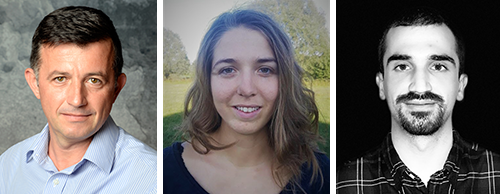Within the framework of the Master in Secondary Education in Mathematics at the University of Luxembourg, students can choose to do a thesis in mathematical didactics. Recently, three graduates who are now secondary school teachers in Luxembourg have published their work in didactical journals and magazines for teachers.
For their Master thesis, Engjëll Begalla, Deborah Stranen and Milko Todorovic tackled different issues in mathematical didactics. Engjëll Begalla chose to investigate “Cyclic and tangential quadrilaterals” while Deborah Stranen focused on “Old-Babylonian mathematics in modern secondary education” and Milko Todorovic addressed “Visualizations of the principle of mathematical induction”. Different journals such as the Flemish-Dutch magazine for teachers Uitwiskeling, the German Society of Mathematical Didactics and the American Mathematical magazine Convergence published their works.

Engjëll Begalla, Deborah Stranen and Milko Todorovic graduated with Professor Antonella Perucca from the Master in Secondary Education in Mathematics and are now mathematics teachers respectively at the Lycée des Arts et Métiers, Lycée Josy Barthel Mamer and Lycée Technique de Lallange. They share their experience as former students and explain in more details their thesis.
Why did you choose to do your Master at uni.lu?
Engjëll : “I have been attracted by the University of Luxembourg as it is a multilingual, international, dynamic, and also a modern institution with a personal atmosphere. The Master programme is of a high standard, with an adequate adapted curriculum, offering students a complete education as a math teacher. Furthermore, it puts a special focus on the issues specific to Luxembourg, such as multilingualism, multiculturality and integration, and gives the needed pedagogical tools and methods to address them adequately.”
Deborah: “I chose to do my Master at the University of Luxembourg because it was offering a new Master called “Master in secondary education”. Since I always wanted to become a Mathematics teacher in secondary school, I knew that this Master would be the perfect preparation for this job. Even though such Master degrees also exist in other countries, it was in my opinion a very good choice of the University of Luxembourg to create this Master to tackle the particularities of the Luxembourgish school system and its multilinguism.”
Milko: “After obtaining my Bachelor’s degree in Mathematics at the University of Luxembourg, I was looking for a Master degree programme which would prepare me to become a qualified mathematics teacher in Luxembourg. The Master in Secondary Education was the ideal choice for me! It allowed me to further my knowledge in pure mathematics and to develop the skills needed for teaching in Luxembourgish classrooms, known for their multilingual and multicultural settings.”
What did you like the most during your Master at uni.lu?
Engjëll : “Pure mathematic courses were oriented towards learning how to think deeply, how to reason analytically, how to think quantitatively, and how to work in a problem-solving environment. Applied didactics courses favoured a deep analysis of hands-on experiences, presented by professionals that work in the field. Also, we acquired the latest teaching practices, new technologies and strategies applied in high school mathematics. Moreover, the professors and lecturers were eager to support me on my endeavours to successfully finish my master studies, even though I was coming back again to the University after more than 20 years.”
Deborah: “I think what I liked most during my Master was the variety. The Master in secondary education combines the study of Mathematics at a high level with the study of mathematical didactics together with general didactics and the study of the Luxembourgish school system and society.”
Milko: “I especially liked the good and effective communication between students and lecturers due to the small class size. Moreover, the six-week internship in a secondary school was an amazing opportunity to gain my first practical experiences in front of a class.”
What is your thesis about?
Engjëll: “I wanted to offer new tools for proving that a particular convex quadrilateral is cyclic/tangential. Therefore, my thesis presents an overall summary and further developments of the geometrical properties associated with cyclic and tangential quadrilaterals. Some of the properties are well known, and some others are less known.”
Deborah: “In a first chapter, the babylonian number system and its limits are analysed. Then, the Babylonian tablet Plimpton 322, which shows Pythagorean triples, is analysed in detail. Finally, a construction method for the decimal analogue of the Babylonian tablet Plimpton 322 is presented, produced by performing operations in base 10, and where all rational numbers are decimal fractions.”
Milko: “Mathematical induction is a very convenient method of proof, which can be applied to all areas of mathematics. It allows to prove many mathematical statements that contain infinitely many cases. The goal of my thesis was to investigate the Principle of Mathematical Induction (PMI) and its variants, and to provide intuitive visualizations, mainly based on rows of falling dominoes.”
What do you like the most in your current job?
Engjëll: “Mathematics fascinates me. While teaching math I have the opportunity to apply the know-hows, pedagogical tools and methods that we got through the Master in Secondary Education in Mathematics at the University of Luxembourg.”
Deborah: “I think what I like most is seeing teenagers develop their knowledge and themselves as a person. I like to see them working and doing their best and the satisfaction they get when they understand a mathematical concept.”
Milko: “The thing I like most about my current job is the interaction with my students. I love helping them understand mathematical subjects and showing them connections between what they are learning and their lives.”
